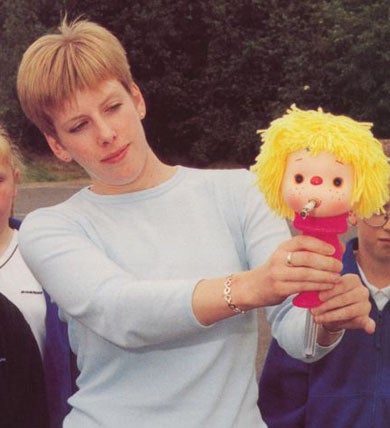Christmas Appeal: Taking the drugs fight to school
In the latest in our series, Paul Vallely looks at an anti-drugs unit working with primary children

Your support helps us to tell the story
From reproductive rights to climate change to Big Tech, The Independent is on the ground when the story is developing. Whether it's investigating the financials of Elon Musk's pro-Trump PAC or producing our latest documentary, 'The A Word', which shines a light on the American women fighting for reproductive rights, we know how important it is to parse out the facts from the messaging.
At such a critical moment in US history, we need reporters on the ground. Your donation allows us to keep sending journalists to speak to both sides of the story.
The Independent is trusted by Americans across the entire political spectrum. And unlike many other quality news outlets, we choose not to lock Americans out of our reporting and analysis with paywalls. We believe quality journalism should be available to everyone, paid for by those who can afford it.
Your support makes all the difference.There is one in every class. At the back of the room a hand kept going up in response to the question as to whether anyone knew the names of any illegal drugs. The boy in the very back row had already offered all the obvious ones. "Smack," he shouted out, with a smirk. "Chickers," he offered next, using the current Leeds slang for ecstasy. The boy was 10.
The woman at the front of the class, Michelle Costello, was not dismayed or shocked. Indeed, this was what she wanted. She wrote it all down on the whiteboard.
It is not surprising that no one seemed shocked at the streetwise 10-year-old from Parklands Primary School in the Seacroft area of Leeds. D:side, the drugs project for which Ms Costello works, was set up in the city in response to a report which shocked even hardened drugs professionals 10 years ago. Then, two boys, aged eight and nine, were discovered injecting themselves with heroin. Teachers in some schools in the city now check playing fields for needles before school sports can begin.
The d:side project was set up by Children in Crisis, one of the charities in this year's Independent Christmas Appeal. It was a controversial project when it began, for it adopted a non-judgemental approach to drugs, offering accurate information about the effects that drugs and alcohol can have, without glamorisation or demonisation. More than that, it worked with primary school children, raising the worry that it might give ideas, rather that just information, to children.
"When discussing illegal drugs we only list those they shout out so we don't introduce new drug names," said Ms Costello. "And we always use the third person; we never say 'you' to kids in describing anything, because the research shows the first step in doing anything is imagining yourself doing it.
"On the other hand, we don't use scare tactics. You lose credibility if you tell kids 'you'll die if you take this drug' when they all know people who're taking it and haven't died. Also, when talking about smoking and alcohol, we don't want them taking such a hard line that they'll get into trouble when they go home with parents who smoke or drink."
Not all parents approve. One group withdrew their children from a d:side class because it was insufficiently judgemental. The charity offers parents and teachers sessions in advance to allay such fears. "When you see it in action," said one Parklands teacher, Heather Knox, who co-ordinates personal, social, health and citizenship education for the school, "you realise they tread a fine line with great skill. Their people are well-trained and they pitch things correctly."
The approach is well grounded in a body of academic and practical findings. "Research shows that children need to learn all this at least four years prior to the age of first experimentation, which is currently, on average, 10, and coming down," said the project manager, Zoe Davis. "Attitudes are very hard to change once they have been formulated at age 12/13."
Evidence also shows that the most effective programmes are interactive, which is why the charity holds its classes in a big custom-built van - kitted out with a giant computer screen, a star-studded ceiling, videos, music, puppets and a robot from the planet Zargon. It also has pull-apart plastic brains, to highlight the effect different drugs have on different sectors of the brain, and with what consequences for the body.
"Children remember 20 per cent of what they read, 30 per cent of what they hear, 40 per cent of what they see, 50 per cent of what they say, 60 per cent of what they do and 90 per cent of what they see, hear, say and do," said Zoe. So role-play is a major tool in teaching.
While one class at Parklands were donning distorted spectacles called " beer goggles", and being made to walk round furniture and catch balls without falling over, another was playing Conscience Alley, in which the class divided into two lines, each one charged with shouting pro- and anti-cannabis messages to pupils taking turns to walk the gauntlet. A third element has developed as the project has discovered, on the job, what works. It is that learning "resistance skills" is vital. Children are taught strategies on how "to say no", present facts, change the subject, make excuses and to walk away.
"It's fantastic," said Stephen Fisher, the headteacher at Parklands. "They come in and talk with authority about a subject which for many teachers is an unknown world. With a catchment area like ours the children know more about drugs than the teachers do." The end result is children who have the information they need to make well-informed, sensible choices, and the skills and confidence to do so.
Join our commenting forum
Join thought-provoking conversations, follow other Independent readers and see their replies
Comments